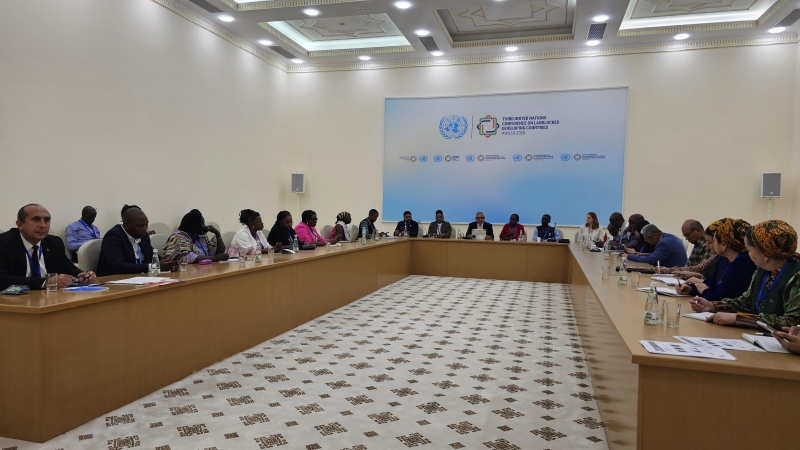- Body of Osman Hadi Returns to Dhaka From Singapore Late |
- Fakhrul condemns attacks on media, calls for unity, justice |
- 2 cops among 4 hurt in clash outside Indian Assit H.C. in Ctg |
- Inqilab Moncho urges people to avoid violence |
- Hadi’s death: Prothom Alo, Daily Star offices set afire |
Civil Society Pushes Bold Agenda for LLDC Development

The meeting of civil society organisaitons
Civil society organisations convened a powerful side event at the Third United Nations Conference on Landlocked Developing Countries (LLDC3), calling for inclusive, equitable, and urgent implementation of the Awaza Programme of Action.
Titled “Empowering LLDCs: Collaborative Solutions for Sustainable Futures”, the session was the only civil society-led event at LLDC3. It was hosted by LDC Watch in collaboration with SAAPE, RRN, SEATINI Uganda, and ZAMSOF, providing a rare platform for grassroots voices to influence global development dialogue.
Dr. Arjun Karki opened the session with a strong call to action, urging all stakeholders to uphold the principles of equity and meaningful participation in implementing the Awaza Programme. He stressed the urgency of addressing the systemic challenges facing LLDCs, from climate crises to digital inequality, says a press release.
Speakers painted a vivid picture of the multifaceted crises confronting landlocked nations. Jane Nalunga of SEATINI Uganda pushed for a fundamental rethinking of trade and industrial policies, advocating for integrated frameworks that centre digital access, gender justice, and education as interconnected solutions.
Gershom Kabaso underscored the power of social movements in driving transformation and insisted that civil society must be seen not as beneficiaries, but as equal partners in shaping and executing development strategies.
From the UN Office for Disaster Risk Reduction (UNDRR), Martina Müller highlighted the acute vulnerability of LLDCs to natural disasters, calling for community-based early warning systems as a core component of resilience building.
Youth advocate Honourine from Rwanda brought forward the voice of a new generation, demanding youth inclusion at every level of climate and development policy. “You can’t decide about youth without them,” she said passionately, reinforcing the demand for intergenerational justice.
Closing the session, human rights scholar Mihir Kanade emphasized the Right to Development as a binding legal entitlement rather than a moral appeal. He encouraged civil society to claim it with confidence and clarity.
Dr. Karki concluded the event with a powerful message: “Development is not a privilege—it is a right. Let us act together to make it real.”
This landmark event demonstrated the critical role civil society plays in envisioning and driving sustainable futures for LLDCs. It sent a clear signal: transformative change must be rooted in solidarity, justice, and collective action.

